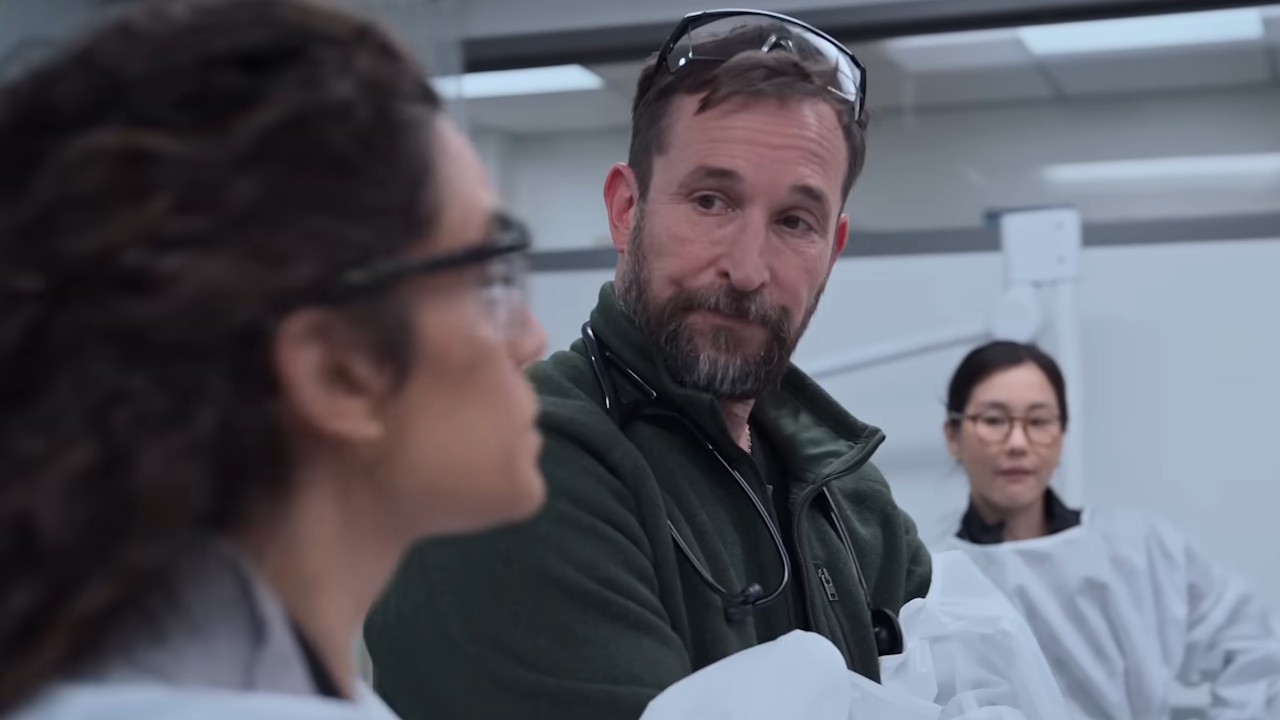Frank Grillo And James Badge Dale Talk Plane Crashes And Extreme Conditions In The Grey

In Joe Carnahan’s The Grey, a plane carrying a group of oil drillers are stranded in the Alaskan wilderness following a plane crash. The crash itself is a harrowing scene filled to the brim with panic and stress as it appears the actors are being put through a real disaster. So just imagine how hard it would be to get off that plane cabin set and on to a real plane that will be taking you to the site where the rest of the film will be made on-location. Not exactly the most comfortable circumstance, but one that Frank Grillo and James Badge Dale had to go through while shooting.
I recently had the chance to participate in a roundtable interview with Grillo and Dale as they discussed their work in The Grey. Read on for the actors’ comments about working in extreme conditions, the real danger they faced, and what they want the audience to take away from the film.
Can you maybe start by talking about the extreme conditions that you were in and the weather and all that?
FG: Yeah, that would be a good place to start. When we got out of the plane they told us that it was going to be cold. We got out of the plane and it was 25 degrees below zero. And, actually, it worked, I think, to our advantage, because we were outside all the time, it was four feet of snow, 70mph winds, and stuff. So right away we knew what we were dealing with and so we didn’t need to make believe we were cold, which is horrible to do. It was what it was. So after the first we got used to it, it was kind of fun. It was kind of fun.
JBD: It’s a lot of fun to watch Frank Grillo in the snow because it’s this whole other barometer. “How cold is it today?” “Just look at Frank and his attitude.” He’s a really bubbly guy, and if Frank is quiet…
FG: Another thing is, I don’t know if you know this, but Liam Neeson is a little bit taller than us…83 feet taller [laughs]. And when we look at him and he’s like waist deep in snow I’m like, “Oh, it’s not so bad.” But it was up to my neck. So it was tough. So that was that.
So how does it feel to have the change of pace, playing the nice guy that you were in Warrior and going to a guy who is less nice.
Your Daily Blend of Entertainment News
FG: You know, I loved doing Warrior for that reason. It was a chess-playing guy who was good, who was innately good and wanted to help somebody. And for this, I went and stayed at Riker’s Island overnight. They let me chill out and be around those people. You feel bad for them, but they’re not nice people and it was kind of fun to be able to go to the other side and be nasty all the time and mean, cause I’m really not a mean guy! Believe it or not.
JBD: It was funny. He refused to remove the neck tattoo. We’d go out to dinner every night and we’d go to these restaurants and people would go, “Who the fuck is that?”
FG: It was great though! I’m a dad, I have three young sons and I’m a normal, kind of normal, guy…
JBD: You’re not normal [laughs].
FG: I’m normal! People look at you and they treat you differently. And it’s like, “Wow,” and you start to feel differently because people treat you differently.
JBD: I think that’s one of the most amazing things about this film, though. We like to play pretend. We like characters who go to different places and do these different things and with this film it was an opportunity to do something that we’ve never done before. It’s an opportunity to go to these far out, way out places and play these people that in our normal lives we don’t get that, we don’t get that at all.
FG: It was good. As brutal as it looked, it was like being a little kid and playing cops and robbers. It was like, “Wow, they’re gonna throw us out in the snow,” and it was tough like anything, but every once and a while it was like…We were on a mountain, the plane crash, the set was on a mountain, and we had to go by snowmobile every day, a half hour up and a half hour down. And there was one day when the winds were blowing so hard bad, it was white out conditions, they were afraid we were going to go off the mountain. They were afraid the snowmobiles would go off the trail and go over, 3,000 feet down and we would die. So there was a point where, “Wait a minute, this is actually dangerous!” But other than that it was fun.
JBD: That day, because I’m not up there with you guys, I’m sitting in my hotel room down in Smithers [British Colombia] looking out the window watching the storm move over the mountain. I was like, “Oh, these guys are in trouble.” [laughs]
FG: Yeah, because of these scenes that we shot, a lot of times he was down in the hotel room and we’re like, “This fucking guy, man.” We’d get back and he’d be all bright eyed and bushy tailed, “Where are we going to dinner?” [laughs].
JBD: The job was like a month of dinners.
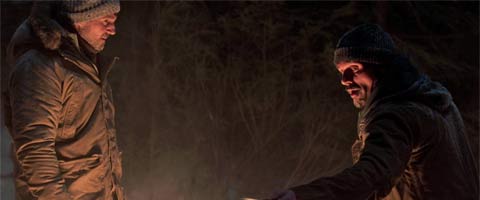
How much of this stuff was shot in sequence and how much time did you guys spend together before being thrown out there in the elements and everything?
FG: We didn’t spend a lot of time together. There was a little bit of rehearsal time, some of us knew each other. I had met with Liam a couple times prior. And then we kind of just did it. You know, Joe [Carnahan] did something smart in that he did the plane crash first. So that was inside, that was the one thing that we did inside, which was like a week or two, we were on a gimbal and it was like being in a plane crash. It was hydraulics and we were throwing up, it was bad. And then he did a genius thing and he put us on an airplane and flew us 800 miles north to the site of the plane crash. So we got on a plane the next day and we were like, “This is not good. This is gonna be a story. Guys filming a plane crash die in a plane crash.” But we made it, and from there on in…we were really bound by the weather, so it got dark at 4:00, and sometimes the weather would come in and it was tough, so we would shift things around. But, you know, we were running from wolves and everything. Basically the movie starts, we crash, we start running from wolves and it ends with us running from wolves. So we could move around a bit.
What were you guys looking at with the wolves? While we were watching it last night it looked like a lot of it had to be done with CGI. Were you guys interacting with animals or a stuffed animal…
FG: There were animatronics. Some of those things were really expensive puppets, basically. It’s interesting, and we kind of knew that the wolves were gonna be… when the movie was made a lot of people were gonna go, “Well, the wolves they were CGI.” And it was by design, because we had wolves there. We could have done it with wolves, but Joe wanted to make the wolves seem mythical, almost not literal. “They don’t look like wolves, they’re CGI.” They’re supposed to be. The movie is not about that wolf. And some people are going to get it, some people are not. Some people are going to say, “Oh, that’s a CGI movie with Liam Neeson,” but you just have to look a little bit, not to get too movies, you just have to look a little further than the wolf. We always felt the presence because Carnahan would play it like, “Grrrrr” in the back, “There are wolves coming! Grrrrr! Run!”
JBD: Run!
JG: Run! And all I was thinking was that I wanted to get back to James because he was in the hotel room by himself! [laughs]
JBD: Joe would talk about the wolves being that kind of ethereal presence and he wanted to shoot them as a film noir-esque thing. Maybe you thought you saw them and they weren’t there and thought you saw them, wasn’t there. And you want to concentrate. He would always talk about, “No, it’s more about you guys, it’s more about you guys.” It’s the outside presence putting the pressure cooker on.
FG: You know, again, I know there are going to be people out there, bloggers and people who review the film, they’re going to be very literal about the wolves and everybody has a right to their opinion, but hopefully they’ll just understand that’s just not…look a little tiny bit further than the wolves. Just see what the wolf represents and leave me alone [laughs].
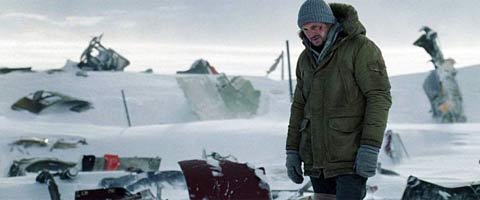
What is the one thing that you want the audience to take from the film?
FG: Just to have a fun ride with it and to see that the journey that these guys take, to invest. Walk away feeling something. Maybe feeling tired, or whatever. Just feel something and talk about it when you leave. I leave so many films and I’m like, “What did I just see?” Actually, the last movie that I saw was [James’] movie, Shame. I walked away and I talked about it – not because of him, because I hate him [laughs] – but my wife and I talked about it for days. We were trying to figure out the psychology of it and that’s what I love. I just hope people go see it.
JBD: It’s a wild thing that we were talking about yesterday. Because you read this and we sat down, both of us wanted to do this movie so bad. And we felt like, okay, every man, every guy is going to understand this story. It came out of Joe’s story and it’s a man’s man story . What’s been so interesting is the response from all the women who have seen it, and they sit down and talk about it, and we sit there and go, “Wow, I don’t understand this movie at all.” [Laughs]
FG: Right, and I understand women less [laughs]. The women who came in got it on a whole different level. I’m like, “Wow, I never thought of that. You’re a smarty-pants.” So it’s interesting and hats off to Joe Carnahan because you make people think. But, again, people are going to look at it like it’s… because it kind of crosses genres, you know? People will look at it one way and say, “It doesn’t live up to that,” people might look at it another way and say, “Well, it’s not that.” You never know with these things.
What do you think the movie has to say about modern masculinity?
FG: That’s a great question. You know, what I think that it has to say is that men are as afraid as when they were children. It’s tough being a man. It really is tough being a man. To define yourself and what do you believe in as a man and what are you willing to do to survive and live and protect your family, whatever those things are. How far will I go before I quit? Because we asked ourselves, “If I was in this situation would I actually be able to do this?” No. I don’t think I would. If my kids were in danger I’m sure I’d be capable of doing some extraordinary things, but I’m not that guy. I’m just not that guy, it’s easier for me to lay down…which is kind of what I did. So I think that it shows people how confusing it is sometimes to be a guy, what is defined, society’s defined to be a man.
JBD: I think your opening quote, “It’s tough to be a man,” might follow you around for a while.
FG: It’s tough to be a man! I say it all the time.
JBD: It is, because we’re not the sharpest knives in the drawer…
FG: No. Well, you’re not certainly.
JBD: No, I’m more like a dull fork. Or a spoon. But these things we talk about, we struggle trying to do the best we can, but we continually mess up and the fascinating thing to me about this film was the regret and the pain and you’re faced with this moment where I’m going, I’m leaving, I’m dying. You’re going to die, I’m going to die, it’s over. Wow, look at all the people I’ve hurt. Look at all the times I’ve messed up. What would I do differently? You know? And we’re not perfect. We fall down, but it’s that effort to try to get back up.
FG: And the fear. My character in the movie is obviously a very frightened man. All the bravado and the talk and everything. We all know people like that. I’ve acted like that sometimes. Out of fear I get angry because I’m angry that I’m afraid. So you project that. Those things you hopefully you learn. You don’t want to be that guy. You don’t want to be John Diaz. You don’t want to be that guy.
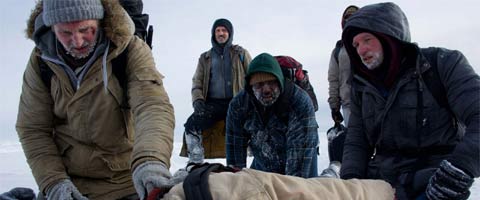
Have you seen the movie with an audience yet?
FG: No.
JBD: No.
While we were watching it, there was a lot, in spite of these really intense situations, there were things that were really funny.
FG: So people laughed.
Yeah, and I think appropriately.
JBD: I will say, I think the script on the page didn’t jump out at you as that funny. But you got everybody together and once we started learning each other’s personalities… it was a wild thing that Joe did, because he brought eight guys together who were completely different, but there was something that was like-minded about all of us, and all of a sudden we’re taking the piss out of each other and it just became this thing and the timing started to work. This rhythm. And there was Joe at the helm, with Liam kind of steering it a bit also, this solid, quiet presence who could also cut you down so quick.
FG: It’s true. He’s a funny guy. Nobody knows it. Have you guys seen him do the thing with Ricky Gervais?
Life’s Too Short!
FG: It’s on a constant loop in my house because he’s a funny guy. And so is Joe Carnahan. He’s like Hemmingway, he’s papa bear. It’s crazy. He lives life fast. It’s 100mph all the time. And I knew early on that if we didn’t find some levity and he didn’t mind it, we’d be in trouble. I did a movie a long time ago called Pride and Glory, which I felt was a great script on the page. And when I saw the movie I was like, “Oh my God, I want to kill myself. I never want to see this movie again. I want to die. I realized that if you don’t insert levity in these films where it’s heavy and it’s white, you’re done. And that’s good to know that there are places where people chuckle, because you need a breath.
JBD: As an audience member I hate being beat over the head with something that’s too serious. I want gallows humor. Because if you can laugh about it and find the irony in it, I feel like the more dramatic subject will land stronger.
FG: I mean, I’ve played a cop or two in my career [laughs], probably will continue to, and when you ask cops, “How do you guys do this? You see the most gruesome, the worst part of humanity.” “We laugh, we joke. It’s the only way you keep your sanity.” So it’s good that it made it into the film.
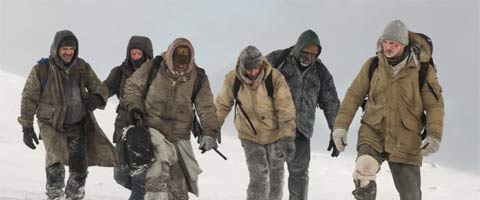
What is coming up immediately on the horizon for you guys?
JBD: I’m literally waiting on a phone call to figure out the nine fucking months of my life right now [laughs]. I have a couple of movies coming out this year. Christmas this year is World War Z, it’s a big…based on the book World War Z by Max Brooks. And it’s Brad Pitt versus the zombies.
FG: And Joe’s brother wrote it.
JBD: Yeah, Joe’s brother wrote it and we have tweaked the book a little bit and taken a time period take on it. But nobody ever trains you what to do when you get on set for zombies.
FG: Or Brad.
JBD: Or Brad! “Hey Brad, how you doing?” “Oh, I’ve got beautiful eyes.” [laughs] Everybody knows! He knows! “Hey, look at my eyes!” He’s such a pleasure to be around and he’s one of the guys. But there’s that weird moment when someone says, “Okay, we’re going to do a half-speed rehearsal with zombies.” And you go, “What?” And all of these zombies are running around everywhere and it’s wild. I think you have, what? Three movies coming out?
FG: I have three movies coming out. I have Lay the Favorite, which is in Sundance. Stephen Frears directed it with Bruce Willis and Catherine Zeta-Jones – it’s really funny and I get to play an Italian guy from New York [laughs]. And then Gangster Squad with [Sean] Penn and [Ryan] Gosling and this thing called Disconnect with Jason Bateman, [Peter] Sarsgaard, Paula Patton and Andrea Riseborough. And The Watch with Jake Gyllenhaal and Michael Pena. And then…I don’t know. I’m unemployed.

Eric Eisenberg is the Assistant Managing Editor at CinemaBlend. After graduating Boston University and earning a bachelor’s degree in journalism, he took a part-time job as a staff writer for CinemaBlend, and after six months was offered the opportunity to move to Los Angeles and take on a newly created West Coast Editor position. Over a decade later, he's continuing to advance his interests and expertise. In addition to conducting filmmaker interviews and contributing to the news and feature content of the site, Eric also oversees the Movie Reviews section, writes the the weekend box office report (published Sundays), and is the site's resident Stephen King expert. He has two King-related columns.
